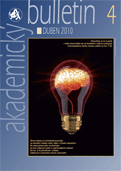24 Sep 2013

Opening of a top centre
A research centre with the latest equipment at the top European level – CZ-OPENSCREEN: National Infrastructure for Chemical Biology –was ceremonially opened today at the complex of the Academy of Sciences of the CR in Krč in Prague with Minister of Education, Youth and Sports Dalibor Štys in attendance. The unique scientific workplace was created within the framework of the Institute of Molecular Genetics of the ASCR and is focused on basic research in the area of chemical biology and genetics. Researchers will seek new chemical compounds that will be used as the basis for the development of new medications or as an instrument for more detailed understanding of cellular processes. For more information, see the
press release.
19 Sep 2013

A new function of the
HOPX gene, which places it among the not very numerous group of genes responsible for the change of the cell of the primary tumour into a metastatic cell, was described by a scientific team at the Institute of Molecular Genetics of the ASCR led by Dr. Jiří Hejnar. Their discovery was published in August this year in the international journal Molecular Cancer Research (see
abstract). It is a generally known fact that in tumour illnesses the main cause of death in patients are precisely metastases, the secondary centres of the tumour scattered in distant organs and tissues, which resist surgery, radiation and are not very sensitive to chemotherapy.
5 Sep 2013

The killifish of the genus of
Nothobranchius – small annual fishes from the savannahs of East Africa– are real record-breakers. Their extremely short life is connected with the fastest sexual maturation of all vertebrates. This significant discovery by scientists from the Institute of Vertebrate Biology of the ASCR in Brno has now been published in the international journal EvoDevo as a component of its articles on life in extreme conditions (see the
abstract). The investigation of killifishes living in savannah pools created during the seasonal monsoon rains.
4 Sep 2013

Early farmers had already brought the field vole to the Orkney Islands north of Scotland 5100 years ago by boat, most likely from the coast of today’s Belgium, and so maintained the genetic diversity that disappeared from Europe. These conclusions highlight research of an international team of scientists led by the University of Aberdeen (United Kingdom) and Cornell University (USA), which was published on Tuesday, 3 September 2013 in a major professional journal Molecular Ecology (see the
abstract). Also researchers from the Institute of Vertebrate Biology of the Academy of Sciences of the CR were involved in one of the most extensive studies of its type.
3 Jun 2013

A discovery by Czech molecular geneticists
Some scientists compare the search for an effective medicine against cancer, which would besides the successful elimination of cancer cells if possible not have any, or at least minimal, side effects for the organism, to the search for the Holy Grail. Unlike Indiana Jones, who in the film The Last Crusade actually found the Holy Grail, the scientific community had not had such luck as of yet. A distinct shift towards this dreamt-of goal could be the discovery by researchers from the Institute of Molecular Genetics of the Academy of Sciences of the ASCR, which was published recently in the online version of the international journal Apoptosis (see the abstract).
17 Jul 2012

After a long illness, Professor Antonín Holý, one of the most important Czech scientists of the 20th century, died on Monday, 16 July 2012. He would have celebrated his 76th birthday on 1 September this year. Antonín Holý, whose professional career was connected particularly with the Institute of Organic Chemistry and Biochemistry (IOCB) of the Academy of Sciences of the CR, discovered new antiviral drugs, which help cure millions of people all over the world. These substances are the basis for the production of the most effective medicines for AIDS available so far as well as medicines for smallpox, herpes zoster, viral infections of the eye membrane or hepatitis B.
29 Feb 2012

New knowledge from virologists from the Academy of Sciences of the CR
Endogenetic retroviruses, which attacked our ancestors millions of years ago and became components of human DNA, which thanks to evolution do not evoke infections in our organisms but some of their genes, on the other hand, benefit us, because they are models of the synthesis of several proteins enriching cells by a new essential function. Nevertheless, in ‘the wrong places’, this at other times welcome life-giving ability can work counterproductively and threaten our health. A team of virologists led by Dr Jiří Hejnar from the Institute of Molecular Genetics of the ASCR has described the mechanisms regulating these processes.
20 Jan 2012

An Article by Czech Scientists in the Journal of Wildlife Diseases
Scientists from Moravian workplaces have proved that bats here suffer from white-nose syndrome, a fungal disease that is threatening the ecosystem in North America. In the Czech Republic as well as in other parts of Europe, bats with this syndrome die only very rarely and the disease has not yet caused a decline in the population numbers. Uncovering the cause of ‘European immunity’ could save North American bats and avert also the disruption of the biological balance in that part of the world.
13 Oct 2011

A Publication of a Czech Neurophysiologist in the Journal Nature
How is the relevant memory activated in the brain? An answer is provided by a just published work in the specialised journal Nature (Theta-paced flickering between place-cell maps in the hippocampus). Doctor Karel Ježek from the Institute of Physiology of the ASCR in cooperation with a team of researchers from the Norwegian University of Science and Technology in Trondheim (NTNU) and the International Institute for Advanced Studies in Trieste (SISSA), led by Prof. Edvard Moser, discovered a method allowing the detailed description of the process of the activation of memory on the level of individual neurons.
20 Sep 2011

A Significant Contribution by a Czech Laboratory
The International Research Initiative for Wheat Improvement (IRIWI) held its first meeting on Thursday, 15 September 2011 in Paris at a meeting of the G20 group, associating the most advanced economies of the world. Distinguished scientists, directors of research organisations, food-industry experts and politicians gathered there. The initiative coordinates worldwide research leading to the improvement of better varieties of wheat. The aim is to increase their crop yields and avert a food crisis. Also Czech scientists from the Institute of Experimental Botany (ÚEB) of the Academy of Sciences of the CR and Centre of the Haná Region for Biotechnological and Agricultural Research cooperate within the IRIWI.
9 Jun 2010
Scientists from the Institute of Organic Chemistry and Biochemistry ASCR have developed a novel simple and efficient methodology for attachment of other molecules to DNA. They prepared DNA bearing very reactive chemical functional groups that can be readily (in one step) linked to diverse other molecules e.g. for studying of molecular mechanism of important biological processes or for labeling of DNA by color or electroactive markers. This methodology has a promising potential for a broad range of applications in interdisciplinary area between chemistry and biology.
9 Jun 2010
10–14 July 2011 - 75th Prague Meeting on Macromolecules be focused on the main topic - CONDUCTING POLYMERS - Formation, structure, properties, and applications. Characterization of conducting polymers by spectroscopic methods. Modelling and simulations. Molar masses and molecular architecture. Electrical, magnetic, mechanical, optical and other physical properties of conducting polymers.
8 Jun 2010

A new study of biological invasions in Europe found they were linked not so much to changes in climate or land cover, but to two dominant factors – more money and more people. Wealth and population density, along with an increase in international trade and commerce, were the forces most strongly associated with invasive species that can disrupt ecosystems and cause severe ecological or agricultural damage, scientists said.
















